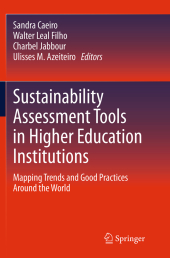 Neuerscheinungen 2016Stand: 2020-02-01 |
Schnellsuche
ISBN/Stichwort/Autor
|
Herderstraße 10
10625 Berlin
Tel.: 030 315 714 16
Fax 030 315 714 14
info@buchspektrum.de |

Ulisses M. Azeiteiro, Sandra Caeiro, Charbel Jabbour, Walter Leal Filho
(Beteiligte)
Sustainability Assessment Tools in Higher Education Institutions
Mapping Trends and Good Practices Around the World
Herausgegeben von Caeiro, Sandra; Leal Filho, Walter; Jabbour, Charbel; Azeiteiro, Ulisses M.
Softcover reprint of the original 1st ed. 2013. 2016. ix, 432 S. 54 SW-Abb., 4 Farbabb., 58 Tabellen. 2
Verlag/Jahr: SPRINGER, BERLIN; SPRINGER INTERNATIONAL PUBLISHING 2016
ISBN: 3-319-37739-6 (3319377396)
Neue ISBN: 978-3-319-37739-1 (9783319377391)
Preis und Lieferzeit: Bitte klicken
As the curricula of higher education institutions around the world are infused with the concept of sustainability, this major contribution to the debate on good practice details a range of assessment tools for evaluating how ´green´ these institutions really are.
This book contributes to debates on current sustainability practices, with a focus on assessment tools as applied in higher education institutions. These institutions are challenged to carry out management, research, and teaching, and to create settings that allow developing new competencies to address the complex global environmental, social, cultural, and economic pressures with which current and future generations are confronted.
The first chapters discuss issues of sustainability in higher education, namely the role of universities in promoting sustainability and the emergent fields of sustainability science and education for sustainable development and how to integrate and motivate sustainability into the university. Subsequent chapters present examples of sustainability assessment tools specifically developed for higher education institutions, such as the AISHE - Auditing Instrument for Sustainability in Higher Education, the GASU - Graphical Assessment of Sustainability in Universities too, the STAUNCH - Sustainability tool for Auditing Universities Curricula in Higher Education. The use of other integrated tools are also presented. The papers have adopted a pragmatic approach, characterized by conceptual descriptions, including sustainability assessment and reorienting the curricula, on the one hand, and practical experiences on the other, with good practices from different edges of the world.
Sustainability Assessment Tools in Higher Education Institutions will be of interest to graduate student, lecturers, researchers, and those setting university policy.


